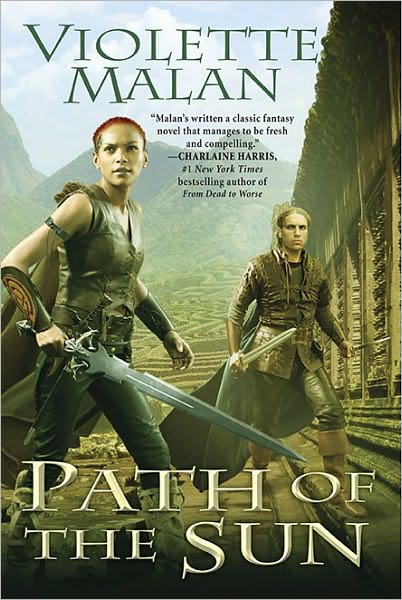
After meeting Violette Malan at ConFusion in Detroit a few weeks back, I wanted to find out a little more about her take on the genre near and dear to my heart, sword-and-sorcery. I asked her if she’d be interested in dropping by Black Gate to say a few words about how she approached her own work in the field, and here’s what she had to say:
When I found sword and sorcery in my teens, there weren’t a lot of strong female protagonists for me to relate to. Jirel of Joiry comes to mind, maybe Red Sonya – but they were already very old by the time I got to them. When I think now of the books and stories I read then, I’m hard pressed to come up with female characters, let alone female protagonists. There must have been some. You know, needing rescuing or marrying or something, but I didn’t find them memorable then, and I don’t really find them memorable now. Okay, I do remember the women that Fafhrd and the Grey Mouser loved, they were well-drawn, significant people. But we all know what happened to them, don’t we? They pretty much continue the tradition of female characters in western literature: if it’s a comedy they marry, if it’s a tragedy, they die. (Hint: for all their humorous elements, the F&GM stories aren’t comedies)
Flash forward a few years and I’m a writer of sword and sorcery, not just a reader. I’m a woman, living in a post-feminist western society, a person who’s written feminist literary criticism (okay, on 18th-century pastoral poetry, but it still counts). Now I get to actually create the kind of female characters I used to imagine when I was young. Protagonists, mind you, real, more-or-less human women. Not the good (or evil) fairies, queens, and goddesses that sociologists and feminist critics call examples of women as “other”.
How was I going to do that? Keeping in mind that – unlike the men – I didn’t have a lot of models I could use as a guide. And keeping in mind that I wanted to avoid either caricature, or cliché. (I think the phrase “no chain mail bras” will cover what I mean by that). I’m not going to talk about how a writer goes about forming any strong character – there are certain elements that apply no matter who or what the character might be. Instead, I’m going to address my own particular dilemma, how to create a strong, female, sword and sorcery protagonist.
…
Read More Read More
 While I was looking for more authors of modern Arabian fantasy, Kai Meyer found me, after reading part of my series here on Black Gate. Already a bestselling author in English (his book, The Water Mirror, went into three printings before its release date), he’s written 51 novels in his native German, including the Middle Eastern influenced, The Stormkings, a trilogy which has not been translated into English… yet. After hearing the description, I’m hoping it will be. The film rights have already been acquired by Oliver Scholl, who has worked on movies such as Independence Day and Jumper.
While I was looking for more authors of modern Arabian fantasy, Kai Meyer found me, after reading part of my series here on Black Gate. Already a bestselling author in English (his book, The Water Mirror, went into three printings before its release date), he’s written 51 novels in his native German, including the Middle Eastern influenced, The Stormkings, a trilogy which has not been translated into English… yet. After hearing the description, I’m hoping it will be. The film rights have already been acquired by Oliver Scholl, who has worked on movies such as Independence Day and Jumper.
 No series on the best of modern Arabian fantasy would be complete without going back to the book that many credit with starting the whole trend, Alamut by Judith Tarr.
No series on the best of modern Arabian fantasy would be complete without going back to the book that many credit with starting the whole trend, Alamut by Judith Tarr.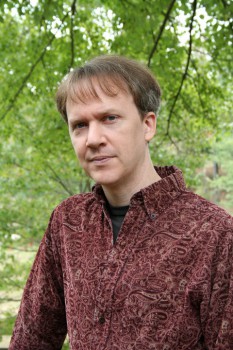 The Middle East has produced some world famous mythology and is fertile ground to base a fantasy novel, as more and more authors are discovering. Over the next several posts I will be exploring this modern day trend and interviewing many of the authors who are mining the lore and culture of the Middle East, and specifically the Arabian Middle East for their work.
The Middle East has produced some world famous mythology and is fertile ground to base a fantasy novel, as more and more authors are discovering. Over the next several posts I will be exploring this modern day trend and interviewing many of the authors who are mining the lore and culture of the Middle East, and specifically the Arabian Middle East for their work.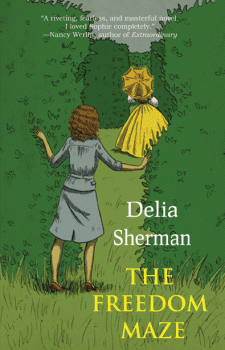
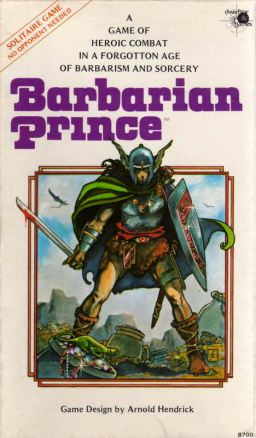
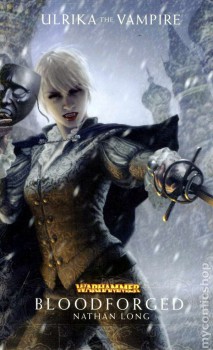 This week Black Gate picks up where we left off in
This week Black Gate picks up where we left off in 
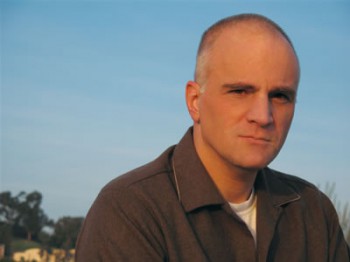 Nathan Long is a novelist best known for his work in the Warhammer universe, most notably for his Black Hearts series and Ulrika the Vampire series, as well as penning the new adventures of the classic Warhammer duo, Gotrek & Felix. Recently, Nathan’s
Nathan Long is a novelist best known for his work in the Warhammer universe, most notably for his Black Hearts series and Ulrika the Vampire series, as well as penning the new adventures of the classic Warhammer duo, Gotrek & Felix. Recently, Nathan’s